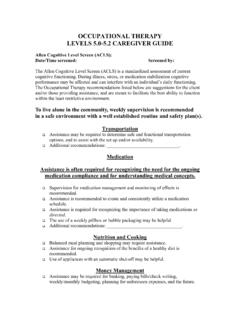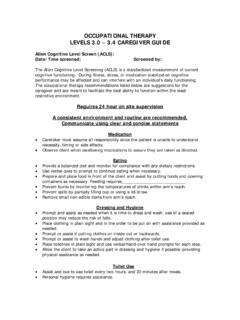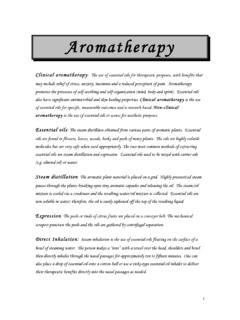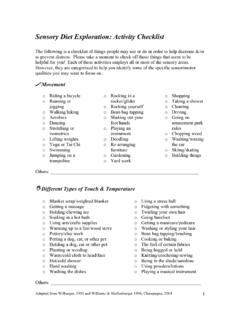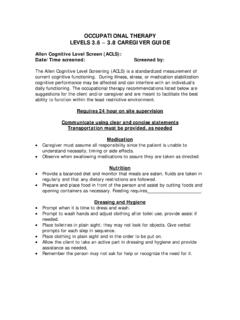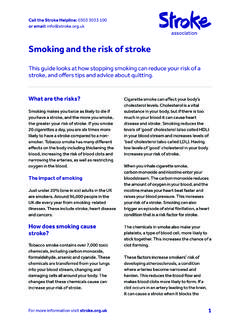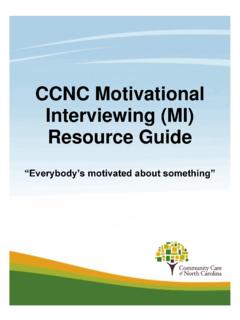Transcription of OCCUPATIONAL THERAPY LEVELS 4.0 – 4.4 CAREGIVER GUIDE
1 OCCUPATIONAL THERAPY . LEVELS CAREGIVER GUIDE . Allen Cognitive Level Screen (ACLS): Date/Time screened: Screened by: The Allen Cognitive Level Screen (ACLS) is a standardized assessment of current cognitive functioning. During illness, stress, or medication stabilization cognitive performance may be affected and can interfere with an individual's daily functioning. The OCCUPATIONAL THERAPY recommendations listed below are suggestions for the client and/or CAREGIVER , and are meant to facilitate the best ability to function within the least restrictive environment. RECOMMEND 2 4 H O U R SUPERVISION. Driving is not recommended transport is required Allow extra time for all activities due to slow pace Medication CAREGIVER must assume all responsibility for administration and monitoring of effects. Observe client when swallowing medications to assure they are taken as directed.
2 The client may not recognize the need to take medications and may require continued reminders/education. Nutrition Assistance to assure a balanced diet is consumed and the following of any dietary restrictions is strongly recommended. Meal planning, shopping and cooking require assistance, and are not recommended unless close supervision and assistance are provided as needed. Safety The client may underestimate or inconsistently anticipate potential hazards within their environment. Therefore, CAREGIVER must provide frequent safety checks to the environment. Recommend set up of home/environment to promote safety: o Installation of tub bench or seat, grab bars and a hand held shower o Adjust hot water thermostat to avoid scalding. o Remove unsteady furniture, small rugs and objects from the floor. o Supervise closely when around the stove or appliances.
3 Appliances with automatic shut-off may be helpful. o Medications and all toxic chemicals are best kept out of reach. o Frequently review safety rules and routines: ( , wet floors, no smoking in bed, use of hand-rails and grab bars, fire escape routes, use of med-alert equipment). o Lock away all power tools & guns. Close supervision is recommended with pet or childcare. Dressing and Hygiene Reminders may be required to wash & dress appropriately, and may attempt to wear the same clothing every day. Place toiletries & clothes in the same location and in plain sight, whenever possible. Allow client to gather items and assist for sequencing and hygiene if needed. Provide verbal prompts to attend to details ( , combing hair on back of head, aligning buttons, zipping zippers or avoiding the over use of cosmetics/cologne). Allow extra time and encourage a daily routine.
4 Remind and provide appropriate clothing for changes in weather. Remind and provide sunscreen, especially if medications increase skin sensitivities. Laundering clothing often requires assistance. Money and Time Management Establish and help to maintain a balanced daily routine. Use of a large calendar in plain sight is recommended, although consistent use will require ongoing assistance. Involve in familiar household tasks with one-step verbal instructions. Facilitate the inclusion of meaningful leisure activities into one's daily routine. Money management may require complete or close supervision. Learning Strategies Verbal skills are often better than actual task performance abilities, and may be deceiving. Provide cues to assist with focusing on the present task. Teach tasks using demonstration, verbal instruction, slow pace, and repetition one step at a time.
5 Practice safety routines and tasks frequently Assistance is required to sequence though the steps of activities, particularly when novel. Learning within one environment does not guarantee the ability to generalize to another. Therefore, when in new situations or environments provide assistance. Avoid giving directions over the phone or in writing. Allow the client to experience cause & effect as appropriate. Remember that they may only recognize immediate and concrete consequences of actions and will require assistance for realistic planning and goal setting. o Refer to enclosed sensory diet form for additional recommendations. Reference Allen, , Blue, T., & Earhart, C. (1995). Understanding Cognitive Performance Modes. Ormond, Florida: Allen Conferences. Compiled by: Tina Champagne , OTR/L Allen Authorized Advisor ~ 12/2003 rev
